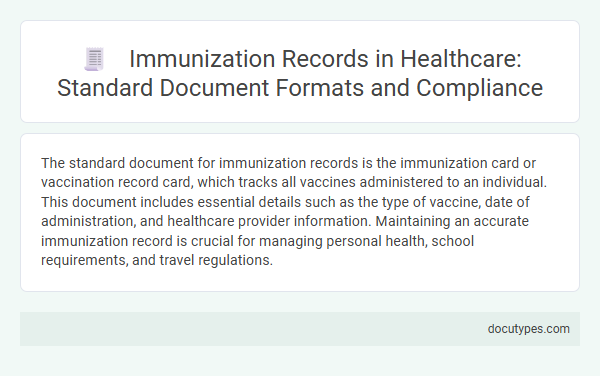The standard document for immunization records is the immunization card or vaccination record card, which tracks all vaccines administered to an individual. This document includes essential details such as the type of vaccine, date of administration, and healthcare provider information. Maintaining an accurate immunization record is crucial for managing personal health, school requirements, and travel regulations.
Introduction to Immunization Records in Healthcare
Immunization records are essential medical documents that track a patient's vaccination history. These records play a crucial role in preventing disease outbreaks and ensuring accurate healthcare management.
The standard document for immunization records is typically the Immunization Information System (IIS) or vaccine card issued by healthcare providers. These documents provide verified evidence of vaccines received and are used by healthcare professionals to guide treatment and compliance with public health requirements.
Importance of Accurate Immunization Documentation
The standard document for immunization records is the official immunization card or electronic health record (EHR) used by healthcare providers. Accurate immunization documentation ensures up-to-date vaccine information is available for medical decision-making and public health tracking.
- Legal Requirement - Immunization records are often required by schools, employers, and travel authorities to verify vaccination status.
- Health Management - Accurate records prevent unnecessary repeat vaccinations and enable timely booster doses.
- Public Health Surveillance - Immunization documentation supports disease outbreak tracking and vaccination coverage assessments.
Standard Formats for Immunization Records
Standard formats for immunization records ensure consistent and accurate documentation of vaccine administration. These formats facilitate seamless communication between healthcare providers and improve patient care quality.
- CDC Vaccination Record Card - The Centers for Disease Control and Prevention (CDC) provides a widely used vaccination card that lists vaccine types, dates, and doses for patient reference.
- Electronic Health Records (EHR) Integration - Immunization data is often incorporated into EHR systems using standardized formats like HL7 to ensure interoperability across healthcare platforms.
- Immunization Information Systems (IIS) - IIS are state or regional databases that utilize standardized data formats to collect and maintain comprehensive immunization histories for populations.
Electronic Health Records (EHR) and Immunization Data
The standard document for immunization records is typically maintained within Electronic Health Records (EHR) systems, which securely store patient immunization data. EHR platforms use standardized formats such as HL7 and FHIR to ensure interoperability and accurate sharing of immunization information across healthcare providers. These electronic immunization records improve data accessibility, support clinical decision-making, and enhance public health reporting and immunization tracking.
Legal and Regulatory Compliance in Immunization Records
| Aspect | Description |
|---|---|
| Standard Document | Immunization Record Card (also known as Immunization Certificate or Vaccination Record) |
| Purpose | Serves as the official documentation of an individual's vaccination history for medical, legal, and educational requirements |
| Legal Compliance | Must comply with federal and state immunization regulations, including the CDC's Immunization Information Systems (IIS) guidelines |
| Regulatory Standards | Follows standards set by the Centers for Disease Control and Prevention (CDC), Health Insurance Portability and Accountability Act (HIPAA) for privacy, and local health department mandates |
| Data Elements Included | Patient identification, vaccine type, lot number, administration date, administering provider, and healthcare facility |
| Format | Paper-based card or digital record stored in Immunization Information Systems (IIS) |
| Retention Requirements | Must be retained according to jurisdictional laws, typically several years after immunization or until patient reaches adulthood |
| Importance in Compliance | Ensures verification of vaccination status for school entry, employment, travel, and outbreak control, minimizing legal liability for healthcare providers |
| Privacy and Security | Protected under HIPAA; access limited to authorized personnel to maintain confidentiality of immunization data |
Interoperability and Data Exchange Standards
The standard document for immunization records is the Immunization Information System (IIS) message, which follows HL7 (Health Level Seven) standards for interoperability. This standard enables seamless data exchange between healthcare providers, public health authorities, and electronic health records (EHR) systems.
HL7 FHIR (Fast Healthcare Interoperability Resources) further enhances the exchange of immunization data by supporting real-time updates and consistent formatting. You can rely on these standards to ensure your immunization records are accurately shared and integrated across different health platforms.
Privacy and Security of Immunization Information
The standard document for immunization records is the Immunization Information System (IIS) record or an official immunization card provided by healthcare providers. These records contain detailed vaccine history necessary for medical care, school enrollment, and travel requirements.
Protecting the privacy and security of immunization information is crucial to prevent unauthorized access and misuse. Healthcare organizations implement strict access controls and encryption methods to safeguard your immunization data. Compliance with regulations such as HIPAA ensures that your personal health information remains confidential and secure.
Challenges in Immunization Record Management
The standard document for immunization records is typically the CDC's Immunization Information System (IIS) or a standardized paper vaccine card. Managing these records effectively involves multiple challenges related to accuracy, accessibility, and data security.
- Data Fragmentation - Immunization records are often scattered across various healthcare providers and systems, complicating patient history consolidation.
- Inconsistent Data Entry - Variability in how immunization information is recorded leads to errors and incomplete records.
- Privacy and Security Concerns - Protecting sensitive patient information while ensuring authorized access remains a critical challenge.
Your immunization history is essential for accurate healthcare delivery, but overcoming these management obstacles is key to maintaining reliable records.
Best Practices for Maintaining Immunization Records
The standard document for immunization records is the official immunization card or certificate issued by healthcare providers or public health authorities. Best practices for maintaining immunization records include keeping the original document in a safe, accessible place and updating it immediately after receiving new vaccines. Digital copies stored in secure health apps or patient portals enhance accessibility and reduce the risk of loss or damage.
What Is the Standard Document for Immunization Records? Infographic

